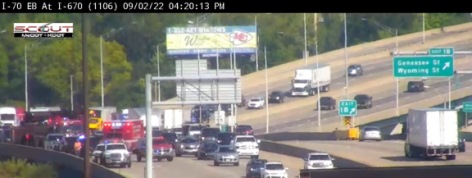Although it’s September, local residents still don’t know whether their property taxes will be going up next year.
The annual budget exercise for local governments and school districts has been extended into September this year, with hearings being held throughout Wyandotte County on local budgets and exceeding the revenue neutral rate.
Proposed budgets have been published, and while the mill levies can be lowered before the final vote, the budgets cannot be raised above the amount published.
Taxpayers turned out to the Unified Government’s budget hearing on Aug. 22 and let commissioners know they wanted lower taxes. Some UG commissioners urged the residents also to turn out to budget hearings being held by school districts and other local governments.
Valuations generally increased throughout the county, meaning if local governments keep the same mill levy rate as last year, property tax bills will go up.
The proposed mill levy for Kansas City, Kansas, was 38.48 and the proposed mill levy for Wyandotte County was 39.33.
The UG Commission is not set to vote on its $431 million budget until Sept. 15, according to information from a recent UG meeting.
At recent budget meetings, there was some UG Commission support to lower the county mill levy by 2 mills. According to the UG, reducing the mill levy by 1 mill would save a resident $17.25 per year on a $150,000 residence. There were also presentations about urgent needs in the community. The “revenue neutral” rate, to get the expenditures to about the same amount as last year, would have been a 9-mill decrease from the proposed mill rate.
KCKCC budget
Three taxpayers took the commissioners’ advice and appeared at the Kansas City Kansas Community College budget hearing on Aug. 23.
Dr. Greg Mosier, KCKCC president, who recommended that the KCKCC board approve the proposed budget, said at the meeting that the college has been keeping the mill levy flat for six years in a row, even though there were additional expenses. The proposed college mill levy rate was 27.318.
According to the KCKCC budget, published in the Wyandotte Echo on Aug. 18, the proposed budgeted expenditures are $93.37 million for 2022-2023, compared to $85.09 million for 2021-2022 and $80.52 million for 2020-2021.
Beverly Watkins, a taxpayer, asked why the college was not meeting with the UG commissioners about tax rates. The commissioners have been talking about having a joint meeting.
According to Dr. Greg Mosier, KCKCC president, the UG, or combined city and county, made up 46 percent of the property tax bill, while there were five other entities that also had mill levies. The college was 16 percent of the tax bill.
Another taxpayer said he didn’t understand why the college was educating more people to get higher-paying jobs in Wyandotte County, when the people would just move out of Wyandotte County when they got the jobs.
Dr. Mosier said 60 percent of the students who graduate from community college stay in the local community. About 30 percent go on to four-year programs.
“Our goal is to educate them so they can stay in their homes,” he said. That would provide them with extra money, better vehicles, home improvement, the ability to purchase a better house and send their kids to school. Construction, automation and manufacturing programs offered by the college can help people make a career and stay in Wyandotte County, he said.
“The way to decrease tax rates is to create more taxpayers,” Dr. Mosier said at the budget hearing. Education will create more taxpayers and lessen the burden on others.
KCKCC is trying to make an investment downtown with a new campus, and that will result in other businesses wanting to come downtown, according to Dr. Mosier.
Linda Hoskins Sutton, a KCKCC board member, said she wanted people to realize the college is keeping the mill levy flat, not raising it. The reason taxes are going up is because appraisals of property went up, she said, but the college is not raising it.
Karl Schottler, a Shawnee, Kansas, resident who owns a business in Kansas City, Kansas, said that at the UG’s public hearing on the budget, people said they were losing their homes because they were being taxed out of them. He said if the college is not reducing the mill levy, then it is increasing people’s taxes.
During the hearing on Aug. 23, Dr. Mosier said Wyandotte County now has the second highest wages in the state, of all counties. The average wage in advanced manufacturing is $75,000 a year and in construction, $67,000 a year.
Those are two of several programs KCKCC wants to launch at its new downtown campus, he said.
Currently, about 70 percent of the high-paying jobs here are going to residents of other counties, he said.
“If we provide education and training to our residents, they can get jobs and keep it in the county,” he said. Even a slight increase in the number of jobs held by local residents would increase the income here by millions of dollars per year.
“As a community college we need to do everything we can to provide training for residents of Wyandotte County,” he said. “It really is an investment in our community.”
The college has already raised a substantial portion of the funds necessary, more than $30 million, for the downtown campus, and still needs additional investment, he said.
“Education is really an economic development tool,” he said.
A survey in 2017 found the college supported 2,800 jobs with a $182.3 million impact on the community, he said.
If they reduced the mill levy a half-mill, it would decrease funding $875,000, he said. If they decreased it 1 mill, it would decrease funding $1.749 million, he said.
If, for example, that meant they could not start a new high-voltage linemen training program, where graduates could make $60,000 a year, that $1.7 million would be quite a tradeoff for not being able to develop the program, he said.
If the college reduced the mill levy by around a half mill, it would save a homeowner of a $200,000 home about $14 a year or $1.18 a month, he said. That amount is not significant, but it makes a difference in the overall college budget, according to Dr. Mosier. If the college reduced the mill levy by a mill it would be a savings of about $28 a year, or $2.36 a month to the homeowner of a $200,000 home.
The KCKCC Board of Trustees voted to approve the budget as presented, after the budget hearing.
School districts and other local governments
Several budget hearings are scheduled in September for school districts and other local governments.
KCK schools
The Kansas City, Kansas, Public Schools’ budget proposes a mill levy of 49.650 for 2022-2023, compared to 49.656 for 2021-2022 and 49.650 for 2020-2021.
It is about a $98 million increase in the proposed expenditures from this year. The proposed expenditures for 2022-2023 are $577,902,471, compared to $479,700,548 in 2021-2022 and $418,823,424 in 2020-2021, according to the budget, presented at a recent meeting.
The KCKPS budget hearing is scheduled at 5:10 p.m. Tuesday, Sept. 13, at the Central Office, 2010 N. 59th St., Kansas City, Kansas. There will be a public hearing on exceeding the revenue neutral tax rate for the 2022-2023 year at 5 p.m. Sept. 13 at 2010 N. 59th St., Kansas City, Kansas.
Turner Public Schools
The Turner Public Schools will hold a public hearing on exceeding the revenue neutral tax rate at 6:10 p.m. Tuesday, Sept. 6, at 800 S. 55th St., Kansas City, Kansas. The Turner schools budget hearing will be at 6:15 p.m. Tuesday, Sept. 6 at 800 S. 55th St., Kansas City, Kansas.
The Turner proposed budget for 2022-2023 is a mill levy of 55.143, compared to 54.318 for 2021-2022 and 53.908 for 2020-2021, according to the budget published in the Record News.
Proposed expenditures are $110.04 million for 2022-2023, as compared to $81.75 million for 2021-2022 and $75.95 million for 2020-2021.
Piper Public Schools
The Piper Public Schools will hold a public hearing on exceeding the revenue neutral tax rate at 6 p.m. Monday, Sept. 12, at 4410 N. 107th St., Kansas City, Kansas. There will be a budget hearing at 6:05 p.m. Sept 12 at 4410 N. 107th.
The proposed 2022-2023 Piper schools budget has a 63.657 mill levy, compared to 57.795 in 2021-2022 and 57.208 in 2020-2021, according to the Piper budget, published in the Wyandotte Echo.
The total proposed expenditures for 2022-2023 for the Piper schools budget are $47.39 million, compared to $40.86 million in 2021-2022 and $38.73 million in 2020-2021.
Bonner Springs Public Schools
The Bonner Springs Public Schools will hold a budget hearing at 7:15 p.m. Sept. 6 at 2200 S. 138th St., Bonner Springs. A public hearing on exceeding the revenue neutral rate will be held at 7 p.m. Sept. 6 at 2200 S. 138th St., Bonner Springs.
The proposed 2022-2023 mill levy rate is 52.254, compared to 57.137 for 2021-2022 and 60.911 for 2020-2021, according to the budget, published in the Wyandotte Echo.
The total proposed expenditures for 2022-2023 are $54.49 million, compared to $48.97 million for 2021-2022 and $50.26 million for 2020-2021.
Bonner Springs city
A budget hearing for the city of Bonner Springs will be held at 7:30 p.m. Sept. 12 at City Hall, 200 E. 3rd St., Bonner Springs.
The proposed mill levy for 2022-2023 is 42.892 mills, compared to 42.892 mills in 2021-2022 and 38.328 mills in 2020-2021, according to the budget, published in the Wyandotte Echo.
The proposed expenditures were $30.03 million for 2022-2023, as compared to $22.23 million in 2021-2022 and $25.62 million in 2020-2021.
Edwardsville city
A public hearing on the budget for Edwardsville city will be held at 6 p.m. Sept. 12 at Edwardsville City Hall, 690 S. 4th St., Edwardsville.
The proposed mill levy for 2022-2023 is 42.844, compared to 42.298 for 20221-2022 and 43.298 for 2020-2021, according to the budget, published in the Wyandotte Echo.
The proposed expenditures for 2022-2023 are $12.28 million, as compared to $9.2 million in 2021-2022 and $9.36 million in 2020-2021.
See earlier story at https://wyandotteonline.com/ug-commission-overrides-mayors-veto-on-revenue-neutral-resolution-as-wyandotte-county-residents-plead-for-lower-taxes/.
More UG budget information is at https://www.wycokck.org/files/assets/public/finance/documents/budget/unified-government-2022-amended-2023-proposed-budget-document.pdf


